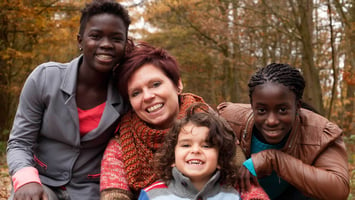There’s a lot of information on our site and elsewhere about how to prepare for your first foster child and, more generally, about being a foster parent. One of our favorites is an article titled "31 Things I’ve Learned About Foster Care.”
In the article, the writer, Amanda, offers an exhaustive look at her own experience of being a foster parent for the first time. Some of what she writes is simple, good advice, such as making sure you have a support group, and some of it is practical, such as how to approach supervised visits from social workers or others involved in the child’s life. It’s all worth reading.
That said, there are some things we want to emphasize about being a foster parent — some of which are not covered in Amanda’s article. Here are a few things you can do to prepare for becoming a foster parent.
1. Build A Solid Foundation Of Support
Parenting a child in foster care can be difficult and sometimes emotional. It’s critical that you and your partner or other caregivers in the home are on the same page and can rely on each other for support.

As you are preparing for your first foster child, openly discuss with those around you how you plan to care for and maintain your marriage, your biological kids’ needs, or other relationships. Also, understand your own self-care needs. After all, if you can’t take care of yourself, how are you going to take care of others?
Most importantly, put those communication and support strategies into practice before you become a foster parent. That way, the habits are ingrained, and your family can move forward as a team.
2. Practice Flexibility
Flexibility is extremely important when working within the foster care system. Be ready for hoops to jump through, appointments that change, and check-ins from social workers and therapists.
Foster children who come into your care will also be coming from a very different environment. They might have complex needs and may exhibit behavioral issues that can be challenging to deal with. That will mean your life will be incredibly different from day to day. Successful foster parents quickly learn how to adjust when plans for the day or week go sideways. This ability to adapt — and do so gracefully, without stressing about it — is something that will most likely naturally develop over your time as a foster parent. But you can start cultivating this skill now, before welcoming a foster child into your home. Give up the little things, let go, and learn to trust.
Successful foster parents quickly learn how to adjust when plans for the day or week go sideways. This ability to adapt — and do so gracefully, without stressing about it — is something that will most likely naturally develop over your time as a foster parent. But you can start cultivating this skill now, before welcoming a foster child into your home. Give up the little things, let go, and learn to trust.
3. Gather Records And Get First Aid Certified
The licensing process to become a foster parent can be lengthy. You’ll need to fill out and submit a lot of paperwork, such as:
- Identity verification documents, such as your driver’s license or passport
- Marriage license and/or divorce decrees
- Financial records to show proof of income and financial health
- Medical reports, including the results of a recent TB test
- Immunization/vaccinations records for you and others living in your home, including any pets
- A floor plan of your home and an emergency evacuation plan

Getting these documents together before they’re needed will make the licensing process go a lot more smoothly.
In addition, you and any other caregiver in the home will need to undergo first aid and CPR training and certification before taking in a foster child. So why not get that taken care of now? Knowing the basics of first aid is an invaluable skill, whether you’re a foster parent or not.
4. Seek Out Resources
You’re likely already doing this to an extent. But the importance of gathering as much information about preparing your home and family for a foster child can’t be overstated.

Even if you are already a parent, parenting a foster child who has experienced trauma is incredibly different from parenting your own child.
Also, keep in mind that foster children are an incredibly diverse group. Your foster child may have a different cultural, racial, or religious background than your own. They may already identify as LGBTQ+ or maybe just discovering their sexual orientation and gender identity. It’s essential that they feel supported and understood, and, like their differences, are celebrated and not ignored.
So seek out opportunities to interact with current foster parents. Start attending a foster parenting support group. And learn all you can about what you might encounter and how you can create a safe, supportive, and loving environment for the children in your care — no matter their background.
If an agency were to call you today with a potential placement, would you be ready to take your first foster child in? Unless you’ve been preparing for that moment, then the answer would most likely be “not at all.”
Logistically, there’s a lot you can and should be doing to prepare both your home and your family for a foster child. To help you prepare, we’ve created a free checklist you can download here.
Additionally, if you’re looking for more information and advice on foster parenting, download our free resource The Essential Guide To Becoming A Foster Parent In Washington State.




